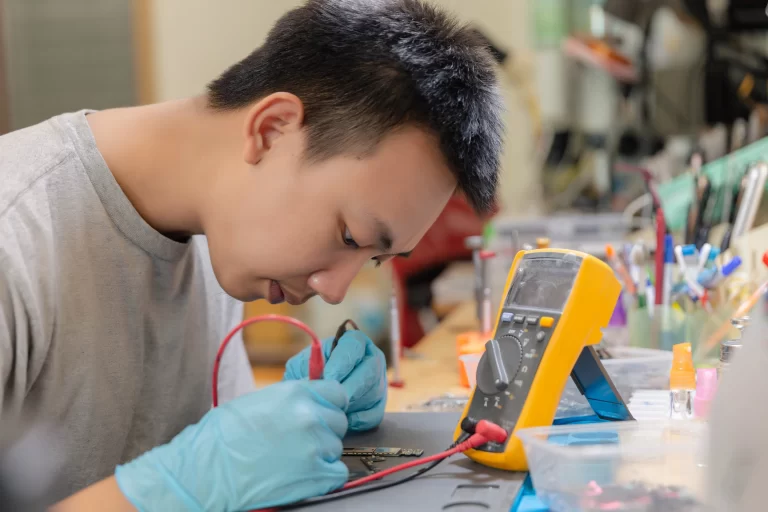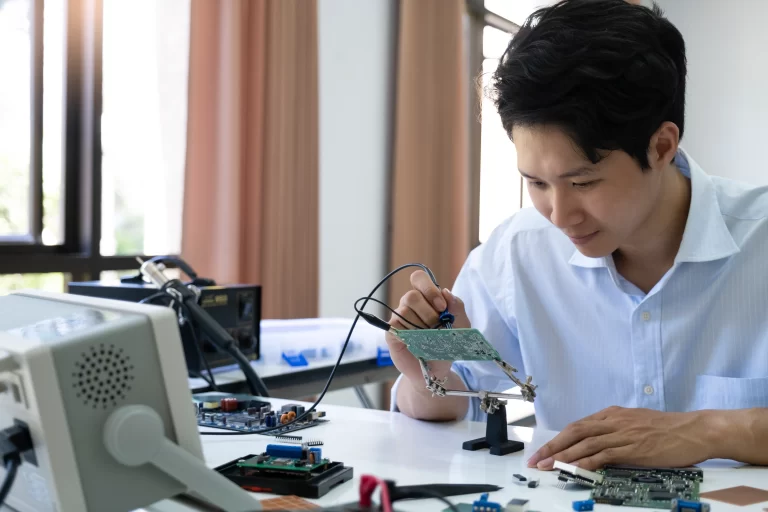Mapúa Institute of Technology at Laguna (MITL)

Bachelor of Science in
Architecture
B.S. Architecture
Program Description
The professional undergraduate program is designed to provide an exceptional college education as well as comprehensive preparation for entry into a competitive and challenging career. Studies in architecture and other basic disciplines are undertaken in parallel throughout the five-year program. The curriculum is designed to develop proficiency in design and conceptualization, enhance skills to communicate ideas through models and graphics, and to gain competence in the artistic, practical and technical aspects of architecture. The program integrates both theoretical and practical approaches to the study with emphasis on the prime development of the students’ creative and critical thinking skills.
Aside from the essential design, planning, structural conceptualization courses, the curriculum also includes core courses in the sciences, ethics and humanities. These are necessary in appreciating the basic philosophy and concepts of the multi-dimensional aspects of architecture. Computer-aided courses in drafting and design are provided not only to immerse the students in the design culture but also to develop in them the artistic skills and technical competencies in using state-of-the-art technologies. In its aim to infuse that high sense of intellectual capacity to seek for the truth, experience new fields and endeavor to enhance quality of life, the program also includes green building principles, sustainable design concepts, research methods and thesis as part of its curriculum requirement. Correlation courses are essential to link the students to the real world and appreciate the realization of the profession.
Educational Objectives
- Ensure mastery of comprehensive architectural knowledge, both in theory and practice, and proficiency of skills by the graduates necessary in the global practice of architecture;
- Promote academic freedom and congenial atmosphere to develop architectural practitioners that could initiate and conduct architectural research and development for the advancement of the profession;
- Infuse a high sense of standard of professional ethics, values, attitudes and sense of responsibility;
- Promote self-managed learning to develop the student’s ability and capacity to analyze facts, to think critically and to express ideas effectively;
- Impart appreciation of the basic philosophy and the fundamental principles of architecture and understanding of the direct relationship between man and his environment in the context of ecological balance and sustainable development; and
- Engender the importance of history and culture in preservation and promotion of the architectural heritage of the country.
Student Outcomes
Graduates of the Bachelor of Science in Architecture program are expected to demonstrate:
- An ability to apply knowledge of arts, science, and architectural design;
- An ability to design and conduct critical analysis and interpret data;
- An ability to do architectural design to meet desired needs within realistic constraints such as economic, environmental, social, political, ethical, health and safety and sustainability;
- An ability to function on multi-disciplinary teams;
- An ability to identify, formulate, and solve architectural problems;
- An understanding of professional and ethical responsibility;
- An ability to communicate effectively;
- The broad education necessary to understand the impact of architectural solutions in a global, economic , environmental, and societal context;
- A recognition of the need for, and an ability to engage in life-long learning;
- A knowledge of contemporary issues; and
- An ability to use the techniques, skills and modern tools necessary for architectural practice.

Bachelor of Science in
Chemical Engineering
B.S. Chemical Engineering
Program Description
The Bachelor of Science in Chemical Engineering program provides an opportunity for developing skills, knowledge, and competencies not only in basic engineering but also in areas related to chemical industries such as in the production of chemicals, drugs, food, materials, cement, energy, and other consumer products. The program is based on the application of mathematics, chemistry, physics, material science, and economics. Computer applications are vital to the program.
Educational Objectives
- Graduates of chemical engineering program will have the technical skills and professional qualifications to become competent engineers who can support the industry, academe, or government.
- Graduates of chemical engineering program will be collaborators and innovators in the field, leading or participating in efforts to address social, technical, ethical, and business challenges.
- Graduates of the chemical engineering program will be engaged in life-long learning and professional development.
Student Outcomes
Graduates of the Bachelor of Science in Chemical Engineering program are expected to demonstrate:
- Apply knowledge of mathematics, natural science, engineering fundamentals and an engineering specialization to the solution of complex engineering problems.
- Conduct investigations of complex engineering problems using research-based knowledge and research methods including design of experiments, analysis and interpretation of data, and synthesis of information to provide valid conclusions.
- Design solutions for complex engineering problems and design systems, components or processes that meet specified needs with appropriate consideration for public health and safety, cultural, societal, and environmental considerations.
- Function effectively as an individual, and as a member or leader in diverse teams and in multi-disciplinary settings.
- Identify, formulate, research literature and analyze complex engineering problems reaching substantiated conclusions using first principles of mathematics, natural sciences and engineering sciences.
- Apply ethical principles and commit to professional ethics and responsibilities and norms of engineering practice.
- Communicate effectively on complex engineering activities with the engineering community and with society at large, such as being able to comprehend and write effective reports and design documentation, make effective presentations, and give and receive clear instructions.
- Understand and evaluate the sustainability and impact of professional engineering work in the solution of complex engineering problems in societal and environmental context.
- Recognize the need for, and have the preparation and ability to engage in independent and life-long learning in the broadest context of technological change.
- Apply reasoning informed by contextual knowledge to assess societal, health, safety, legal and cultural issues and the consequent responsibilities relevant to professional engineering practice and solutions to complex engineering problems.
- Create, select and apply appropriate techniques, resources, and modern engineering and IT tools, including prediction and modelling, to complex engineering problems with an understanding of the limitations.
- Demonstrate knowledge and understanding of engineering management principles and economic decision-making and apply these to one’s own work, as a member and leader in a team, to manage projects and in multidisciplinary environments.

Bachelor of Science in
Civil Engineering
B.S. Civil Engineering
Program Description
The Bachelor of Science in Civil Engineering program aims to provide the highest quality, broad-based technical, scientific, and liberal education to enable students to qualify for graduate or advanced education and professional work in a wide range of civil engineering activities.
The program is a balanced learning experience covering geotechnical engineering, structural engineering, transportation and traffic engineering, water resources engineering, environmental engineering, construction engineering and management, and project planning and administration. The program’s thrust is to create and maintain an educational environment that promotes diverse skills and practical applications designed to prepare students for their entry into the profession and to foster in them the need to observe ethical standards.
Educational Objectives
- Graduates of the Bachelor of Science in Civil Engineering program are envisioned to:
- Have the technical skills and professional qualifications to become competent engineers who can support the industry, academe, or government.
- Be collaborators and innovators in the field, leading or participating in efforts to address social, technical, ethical, and business challenges.
- Be engaged in life-long learning and professional development.
Student Outcomes
Graduates of the Civil Engineering program should have the:
- Apply knowledge of mathematics, natural science, engineering fundamentals and an engineering specialization to the solution of complex engineering problems.
- Conduct investigations of complex engineering problems using research-based knowledge and research methods including design of experiments, analysis and interpretation of data, and synthesis of information to provide valid conclusions.
- Design solutions for complex engineering problems and design systems, components or processes that meet specified needs with appropriate consideration for public health and safety, cultural, societal, and environmental considerations.
- Function effectively as an individual, and as a member or leader in diverse teams and in multi-disciplinary settings.
- Identify, formulate, research literature and analyze complex engineering problems reaching substantiated conclusions using first principles of mathematics, natural sciences and engineering sciences.
- Apply ethical principles and commit to professional ethics and responsibilities and norms of engineering practice.
- Communicate effectively on complex engineering activities with the engineering community and with society at large, such as being able to comprehend and write effective reports and design documentation, make effective presentations, and give and receive clear instructions.
- Understand and evaluate the sustainability and impact of professional engineering work in the solution of complex engineering problems in societal and environmental context.
- Recognize the need for, and have the preparation and ability to engage in independent and life-long learning in the broadest context of technological change.
- Apply reasoning informed by contextual knowledge to assess societal, health, safety, legal and cultural issues and the consequent responsibilities relevant to professional engineering practice and solutions to complex engineering problems.
- Create, select and apply appropriate techniques, resources, and modern engineering and IT tools, including prediction and modelling, to complex engineering problems with an understanding of the limitations.
- Demonstrate knowledge and understanding of engineering management principles and economic decision-making and apply these to one’s own work, as a member and leader in a team, to manage projects and in multidisciplinary environments.

Bachelor of Science in
Computer Engineering
B.S. Computer Engineering
Program Description
The Bachelor of Science in Computer Engineering program provides students with the required skills and competencies needed in the field of computer, communication and information technology. The program will help develop fundamental understanding of computer engineering, its applications and its underlying concepts.
Graduates are expected to understand computer hardware and software and their interdependencies as computer engineering focuses on the areas of digital systems, computer architecture, microprocessors, computer programming using machine level and high level languages, data communications, computer networks and operating systems, among others.
Educational Objectives
- Graduates of computer engineering program will have the technical skills and professional qualifications to become competent engineers who can support the industry, academe, or government.
- Graduates of computer engineering program will be collaborators and innovators in the field, leading or participating in efforts to address social, technical, ethical and business challenges.
- Graduates of computer engineering program will be engaged in life-long learning and professional development.
Student Outcomes
Graduates of the Bachelor of Science in Computer Engineering program are expected to demonstrate:
- Apply knowledge of mathematics, natural science, engineering fundamentals and an engineering specialization to the solution of complex engineering problems.
- Conduct investigations of complex engineering problems using research-based knowledge and research methods including design of experiments, analysis and interpretation of data, and synthesis of information to provide valid conclusions.
- Design solutions for complex engineering problems and design systems, components or processes that meet specified needs with appropriate consideration for public health and safety, cultural, societal, and environmental considerations.
- Function effectively as an individual, and as a member or leader in diverse teams and in multi-disciplinary settings.
- Identify, formulate, research literature and analyze complex engineering problems reaching substantiated conclusions using first principles of mathematics, natural sciences and engineering sciences.
- Apply ethical principles and commit to professional ethics and responsibilities and norms of engineering practice.
- Communicate effectively on complex engineering activities with the engineering community and with society at large, such as being able to comprehend and write effective reports and design documentation, make effective presentations, and give and receive clear instructions.
- Understand and evaluate the sustainability and impact of professional engineering work in the solution of complex engineering problems in societal and environmental context.
- Recognize the need for, and have the preparation and ability to engage in independent and life-long learning in the broadest context of technological change.
- Apply reasoning informed by contextual knowledge to assess societal, health, safety, legal and cultural issues and the consequent responsibilities relevant to professional engineering practice and solutions to complex engineering problems.
- Create, select and apply appropriate techniques, resources, and modern engineering and IT tools, including prediction and modelling, to complex engineering problems with an understanding of the limitations.
- Demonstrate knowledge and understanding of engineering management principles and economic decision-making and apply these to one’s own work, as a member and leader in a team, to manage projects and in multidisciplinary environments.

Bachelor of Science in
Electrical Engineering
B.S. Electrical Engineering
Program Description
The Bachelor of Science in Electrical Engineering program deals with the study and use of technology and applied science involving electrical phenomena. It is important that the student builds a good foundation in the areas of mathematics and physical science. It is oriented towards the understanding of the basic theory and concepts needed for entry into any of the many activities in the profession including but not limited to design, operations and management, teaching, sales and consulting.
Laboratory experience is emphasized to provide familiarity with electrical, electronic and computing equipment and with experimental techniques. Modern tools and laboratory equipment are available for electrical and electronic circuits, machines, power systems and computers.
Educational Objectives
- Graduates of electrical engineering program will have the technical skills and professional qualifications to become competent engineers who can support the industry, academe, or government.
- Graduates of electrical engineering program will be collaborators and innovators in the field, leading or participating in efforts to address social, technical, ethical, and business challenges.
- Graduates of electrical engineering program will be engaged in life-long learning and professional development.
Student Outcomes
Graduates of Bachelor of Science in Electrical Engineering program are expected to demonstrate:
- Apply knowledge of mathematics, natural science, engineering fundamentals and an engineering specialization to the solution of complex engineering problems.
- Conduct investigations of complex engineering problems using research-based knowledge and research methods including design of experiments, analysis and interpretation of data, and synthesis of information to provide valid conclusions.
- Design solutions for complex engineering problems and design systems, components or processes that meet specified needs with appropriate consideration for public health and safety, cultural, societal, and environmental considerations.
- Function effectively as an individual, and as a member or leader in diverse teams and in multi-disciplinary settings.
- Identify, formulate, research literature and analyze complex engineering problems reaching substantiated conclusions using first principles of mathematics, natural sciences and engineering sciences.
- Apply ethical principles and commit to professional ethics and responsibilities and norms of engineering practice.
- Communicate effectively on complex engineering activities with the engineering community and with society at large, such as being able to comprehend and write effective reports and design documentation, make effective presentations, and give and receive clear instructions.
- Understand and evaluate the sustainability and impact of professional engineering work in the solution of complex engineering problems in societal and environmental context.
- Recognize the need for, and have the preparation and ability to engage in independent and life-long learning in the broadest context of technological change.
- Apply reasoning informed by contextual knowledge to assess societal, health, safety, legal and cultural issues and the consequent responsibilities relevant to professional engineering practice and solutions to complex engineering problems.
- Create, select and apply appropriate techniques, resources, and modern engineering and IT tools, including prediction and modelling, to complex engineering problems with an understanding of the limitations.
- Demonstrate knowledge and understanding of engineering management principles and economic decision-making and apply these to one’s own work, as a member and leader in a team, to manage projects and in multidisciplinary environments.

Bachelor of Science in
Electronics Engineering
B.S. Electronics Engineering
Program Description
The Bachelor of Science in Electronics Engineering program provides an infrastructure that will allow the full development of the student in preparation for professional life as an electronics engineer. Its curriculum provides diverse activities and opportunities in the fields of telecommunications and electronics engineering. The program offers eight (8) specialization tracks, namely: Instrumentation and Control Track, Microelectronics Track, Telecommunication Track, Semicon and Electronic Manufacturing Track, Broadcasting, Power Electronics Track, Biomedical Electronics, and Computer Systems. These tracks are designed to further guide the students in jumpstarting their career.
Educational Objectives
- Graduates of the electronics engineering program will have the technical skills and professional qualifications to become competent engineers who can support the industry, academe, or government.
- Graduates of the electronics engineering program will be collaborators and innovators in the field, leading or participating in efforts to address social, technical, ethical, and business challenges.
- Graduates of the electronics engineering program will be engaged in life-long learning and professional development.
Student Outcomes
Graduates of the Bachelor of Science in Electronics Engineering program are expected to demonstrate:
- Apply knowledge of mathematics, natural science, engineering fundamentals and an engineering specialization to the solution of complex engineering problems.
- Conduct investigations of complex engineering problems using research-based knowledge and research methods including design of experiments, analysis and interpretation of data, and synthesis of information to provide valid conclusions.
- Design solutions for complex engineering problems and design systems, components or processes that meet specified needs with appropriate consideration for public health and safety, cultural, societal, and environmental considerations.
- Function effectively as an individual, and as a member or leader in diverse teams and in multi-disciplinary settings.
- Identify, formulate, research literature and analyze complex engineering problems reaching substantiated conclusions using first principles of mathematics, natural sciences and engineering sciences.
- Apply ethical principles and commit to professional ethics and responsibilities and norms of engineering practice.
- Communicate effectively on complex engineering activities with the engineering community and with society at large, such as being able to comprehend and write effective reports and design documentation, make effective presentations, and give and receive clear instructions.
- Understand and evaluate the sustainability and impact of professional engineering work in the solution of complex engineering problems in societal and environmental context.
- Recognize the need for, and have the preparation and ability to engage in independent and life-long learning in the broadest context of technological change.
- Apply reasoning informed by contextual knowledge to assess societal, health, safety, legal and cultural issues and the consequent responsibilities relevant to professional engineering practice and solutions to complex engineering problems.
- Create, select and apply appropriate techniques, resources, and modern engineering and IT tools, including prediction and modelling, to complex engineering problems with an understanding of the limitations.
- Demonstrate knowledge and understanding of engineering management principles and economic decision-making and apply these to one’s own work, as a member and leader in a team, to manage projects and in multidisciplinary environments.

Bachelor of Science in
Industrial Engineering
B.S. Industrial Engineering
Program Description
The Industrial Engineering program deals in the design, improvement and installation of products, processes and integrated systems of people, materials, information, equipment and energy. The program must have a specialized knowledge and skills in the mathematical, physical and social sciences together with the principles and methods of engineering analysis and design to specify, predict, and evaluate the results to be obtained from such systems. The program provides a broad spectrum including production planning and control, manufacturing systems and processes, facilities design, human factors, occupational safety, quality control, systems reliability, and systems analysis and design with a strong emphasis on advanced computing. A total systems approach is used to optimize the various aspects of operations in both manufacturing and service industries.
Graduates of the program use many analytical approaches to improve productivity, safety, and quality of working life while reducing operating costs.
Educational Objectives
- Graduates of the Bachelor of Science in Industrial Engineering program are envisioned to:
- Have the technical skills and professional qualifications to become competent engineers who can support the industry, academe, or government.
- Be collaborators and innovators in the field, leading or participating in efforts to address social, technical, ethical, and business challenges.
- Be engaged in life-long learning and professional development.
Student Outcomes
Graduates of the Bachelor of Science in Industrial Engineering program are expected to demonstrate the:
- Apply knowledge of mathematics, natural science, engineering fundamentals and an engineering specialization to the solution of complex engineering problems.
- Conduct investigations of complex engineering problems using research-based knowledge and research methods including design of experiments, analysis and interpretation of data, and synthesis of information to provide valid conclusions.
- Design solutions for complex engineering problems and design systems, components or processes that meet specified needs with appropriate consideration for public health and safety, cultural, societal, and environmental considerations.
- Function effectively as an individual, and as a member or leader in diverse teams and in multi-disciplinary settings.
- Identify, formulate, research literature and analyze complex engineering problems reaching substantiated conclusions using first principles of mathematics, natural sciences and engineering sciences.
- Apply ethical principles and commit to professional ethics and responsibilities and norms of engineering practice.
- Communicate effectively on complex engineering activities with the engineering community and with society at large, such as being able to comprehend and write effective reports and design documentation, make effective presentations, and give and receive clear instructions.
- Understand and evaluate the sustainability and impact of professional engineering work in the solution of complex engineering problems in societal and environmental context.
- Recognize the need for, and have the preparation and ability to engage in independent and life-long learning in the broadest context of technological change.
- Apply reasoning informed by contextual knowledge to assess societal, health, safety, legal and cultural issues and the consequent responsibilities relevant to professional engineering practice and solutions to complex engineering problems.
- Create, select and apply appropriate techniques, resources, and modern engineering and IT tools, including prediction and modelling, to complex engineering problems with an understanding of the limitations.
- Demonstrate knowledge and understanding of engineering management principles and economic decision-making and apply these to one’s own work, as a member and leader in a team, to manage projects and in multidisciplinary environments.

Bachelor of Science in
Mechanical Engineering
B.S. Mechanical Engineering
Program Description
The Bachelor of Science in Mechanical Engineering program draws upon a number of basic and applied sciences to design, build and improve devices, machines, processes and systems that involve mechanical forces, work and energy. It emphasizes the study of the efficient transformation of energy from one form to another and the behavior of solids, liquids and gases.
The program includes the design and manufacture of structures used in industrial, biomedical, instrumentation and transportation systems. It also includes converting thermal and chemical energy into mechanical work through engines and power plants; transporting energy via devices like heat exchangers, pipelines, gears and linkages; and utilizing energy, forces and structures to perform a variety of tasks. Since all manufactured products contain parts that transmit forces, mechanical engineering is considered vital in designing and selecting materials that will ensure the structural integrity of almost every product.
Educational Objectives
- Graduates of mechanical engineering program will have the technical skills and professional qualifications to become competent engineers who can support the industry, academe, or government.
- Graduates of mechanical engineering program will be collaborators and innovators in the field, leading or participating in efforts to address social, technical, ethical, and business challenges.
- Graduates of the mechanical engineering program will be engaged in life-long learning and professional development.
Student Outcomes
Graduates of Mechanical Engineering Program are expected to demonstrate:
- Apply knowledge of mathematics, natural science, engineering fundamentals and an engineering specialization to the solution of complex engineering problems.
- Conduct investigations of complex engineering problems using research-based knowledge and research methods including design of experiments, analysis and interpretation of data, and synthesis of information to provide valid conclusions.
- Design solutions for complex engineering problems and design systems, components or processes that meet specified needs with appropriate consideration for public health and safety, cultural, societal, and environmental considerations.
- Function effectively as an individual, and as a member or leader in diverse teams and in multi-disciplinary settings.
- Identify, formulate, research literature and analyze complex engineering problems reaching substantiated conclusions using first principles of mathematics, natural sciences and engineering sciences.
- Apply ethical principles and commit to professional ethics and responsibilities and norms of engineering practice.
- Communicate effectively on complex engineering activities with the engineering community and with society at large, such as being able to comprehend and write effective reports and design documentation, make effective presentations, and give and receive clear instructions.
- Understand and evaluate the sustainability and impact of professional engineering work in the solution of complex engineering problems in societal and environmental context.
- Recognize the need for, and have the preparation and ability to engage in independent and life-long learning in the broadest context of technological change.
- Apply reasoning informed by contextual knowledge to assess societal, health, safety, legal and cultural issues and the consequent responsibilities relevant to professional engineering practice and solutions to complex engineering problems.
- Create, select and apply appropriate techniques, resources, and modern engineering and IT tools, including prediction and modelling, to complex engineering problems with an understanding of the limitations.
- Demonstrate knowledge and understanding of engineering management principles and economic decision-making and apply these to one’s own work, as a member and leader in a team, to manage projects and in multidisciplinary environments.
Fully Online Degrees
Bachelor of Science in
Electronics Engineering
Fully Online Degree
B.S. Electronics Engineering - Fully Online Degree
Program Description
The Bachelor of Science in Electronics Engineering online program provides an infrastructure that will allow the full development of the student in preparation for professional life as an electronics engineer. Its curriculum provides diverse activities and opportunities in the fields of telecommunications and electronics engineering. The program offers eight (8) specialization tracks, namely: Instrumentation and Control Track, Microelectronics Track, Telecommunication Track, Semicon and Electronic Manufacturing Track, Broadcasting, Power Electronics Track, Biomedical Electronics, and Computer Systems. These tracks are designed to further guide the students in jumpstarting their career.
Educational Objectives
Graduates of the Bachelor of Science in Electronics Engineering program are envisioned to:
- Have the technical skills and professional qualifications to become competent engineers who can support the industry, academe, or government.
- Be collaborators and innovators in the field, leading or participating in efforts to address social, technical, ethical and business challenges.
- Be engaged in life-long learning and professional development.
Student Outcomes
Graduates of the Bachelor of Science in Electronics Engineering program are expected to demonstrate:
- Ability to apply knowledge of mathematics and science to solve engineering problems.
- Ability to design and conduct experiments, as well as to analyze and interpret data.
- Ability to design a system, component, or process to meet desired needs within realistic constraints such as economic, environmental, social, political, ethical, health and safety, manufacturability, and sustainability, in accordance with standards.
- Ability to function on multidisciplinary teams.
- Ability to identify, formulate, and solve engineering problems.
- Understanding of professional and ethical responsibility.
- Ability to communicate effectively.
- Broad education necessary to understand the impact of engineering solutions in a global, economic, environmental, and societal context.
- Recognition of the need for, and an ability to engage in lifelong learning.
- Knowledge of contemporary issues.
- Ability to use techniques, skills, and modern engineering tools necessary for engineering practice.
- Knowledge and understanding of engineering and management principles as a member and leader in a team, to manage projects and in multidisciplinary environments.
- Ability to apply knowledge of electronics engineering in at least one specialized field of electronics engineering practice.
Bachelor of Science in
Industrial Engineering
Fully Online Degree
B.S. Industrial Engineering -
Fully Online Degree
Program Description
The Bachelor of Science in Industrial Engineering online program is designed to prepare the students for a professional industrial engineering career including a leading role in the design, improvement, and installation of integrated systems of people, materials, information, equipment, and energy. Graduates of the program must have a specialized knowledge and skills in the mathematical, physical and social sciences together with the principles and methods of engineering analysis and design to specify, predict, and evaluate the results to be obtained from such systems. The program provides a broad spectrum of principles in production planning and control, manufacturing systems and processes, facilities design, human factors, occupational safety, quality control, systems reliability, and systems analysis and design with a strong emphasis on advanced computing. A total systems approach is used to optimize the various aspects of operations in both manufacturing and service industries.
Graduates of the program use many analytical approaches to improve productivity, safety, and quality of working life while reducing operating costs.
Educational Objectives
- Graduates of industrial engineering program will have the technical skills and professional qualifications to become competent engineers who can support the industry, academe, or government.
- Graduates of industrial engineering program will be collaborators and innovators in the field, leading or participating in efforts to address social, technical, ethical and business challenges.
- Graduates of industrial engineering program will be engaged in life-long learning and professional development.
Student Outcomes
Graduates of the Bachelor of Science in Industrial Engineering program are expected to demonstrate:
- Ability to apply knowledge of mathematics and science to solve engineering problems
- Ability to design and conduct experiments, as well as to analyze and interpret data
- Ability to design a system, component, or process to meet desired needs within realistic constraints such as economic, environmental, social, political, ethical, health and safety, manufacturability, and sustainability, in accordance with standards
- Ability to function on multidisciplinary teams
- Ability to identify, formulate, and solve engineering problems
- Understanding on professional and ethical responsibility
- Ability to communicate effectively
- Broad education necessary to understand the impact of engineering solutions in a global, economic, environmental, and societal context
- Recognition of the need for, and an ability to engage in lifelong learning
- Knowledge of contemporary issues
- Ability to use techniques, skills, and modern engineering tools necessary for engineering practice
- Knowledge and understanding of engineering and management principles as a member and leader in a team, to manage projects and in multidisciplinary environments
- Ability to design, develop, implement, and improve integrated systems that include people, materials, information, equipment, and energy.
World-Class Education – Now Fully Online
Self-Paced and Accessible Learning – Anytime, Anywhere
Through Mapúa MCL’s Learning Management System, Blackboard Learn, online modules are easily available anytime and anywhere that students can access with internet, allowing for convenient and self-paced learning that you can fit into your busy schedule or while pursuing other passions.
Highly Qualified, Online-Ready Faculty
Not only are Mapúa MCL’s faculty members highly qualified – they are also well-trained in the online delivery of learning. With blended learning tools in place for more than a decade, the institution provides training that enables mentors to maximize their use, making the transition to a fully online educational environment seamless for you.
Easy Access to Online Resources and Tools
As you navigate your fully online degree, you may find that extra learning materials are often needed for research and other purposes. Through the Center for Learning and Information Resources’ Online Services, students can easily coordinate with Mapúa MCL’s librarians to request for scanned book chapters, e-copies of theses, e-journals, and more. E-Learning tools such as Wiley Digital Solutions, Blackboard Collaborate, ScienceDirect, Britannica Academic, Labster, LinkedIn Learning, and Coursera are also available.
Strong Student Intervention Programs
Online learning may still come with challenges, especially when it comes to juggling time. With Mapúa MCL’s student intervention programs, you can rest assured that you will have life coaches to support and guide you to surpass them, even as you navigate your professional work life.
Online Admissions
Mapúa MCL’s Admissions Office has prepared a fully online process for new student admission and application for your convenience and safety. With a few clicks and submission of forms and other credentials, you will soon be on your way to an easy remote enrollment.

